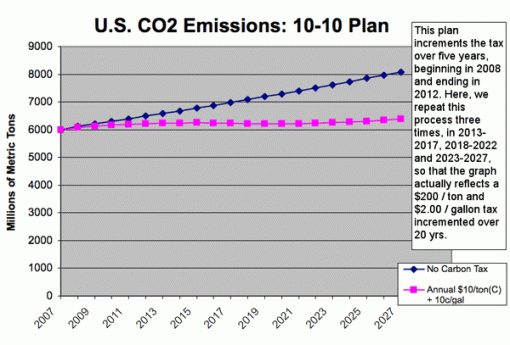The Carbon Tax Center recommends that a carbon tax be revenue-neutral for both equity and political reasons, as discussed in an issue paper on this site. We recognize, of course, that Congress will inevitably see carbon tax revenues as the funding source for a variety of needs such as: paying for advanced technology, energy efficiency and renewables to reduce greenhouse gas emissions; providing Americans with decent health care; or, at the other extreme, paying the huge costs of the disastrous war in Iraq.
Carolyn Lochhead, writing in the San Francisco Chronicle this week, describes other possibilities in her column excerpted below:
Rep. Charlie Rangel, chair of the House Ways and Means Committee, is hunting for $1 trillion to repeal the alternative minimum tax. Sen. Barack Obama, like every Democratic candidate, wants to end global warming.
One day, someone’s going to put two and two together and discover that East Bay Rep. Pete Stark’s carbon tax could address global warming and budget troubles at the same time.
San Francisco pols are ahead of the curve, proposing a gas tax — a close cousin of the carbon tax — to fight global warming.
Of course a carbon tax is about as popular in Washington as leprosy. Obama, like most Democrats, is still talking about making "polluters pay," as if only businesses burn fossil fuels, not those people you see driving cars and living in houses.
In policy circles, a carbon tax is a no brainer, embraced by lefties like Stark and conservatives like former Bush economic advisor Gregory Mankiw. It’s a highly efficient way to reduce demand for fossil fuels and induce alternative energy supplies by using market forces. That’s also why it gags politicians: it incorporates the true cost of fossil fuel consumption in prices. Polluting consumers would pay too.
But politicians like the money it could raise. Mankiw estimates that a $1 a gallon gasoline tax could bring in $100 billion a year; a carbon tax could generate much more by hitting all fossil fuels.
Meanwhile, the onrushing baby boom retirement is about to bankrupt the country — nevermind the alternative minimum tax that promises to swallow 23 million more people this year unless Rangel miraculously finds his $1 trillion.

 Today Dingell posted on his Web site a
Today Dingell posted on his Web site a 
 For climate-change skeptics and deniers, it’s no doubt a frustrating time to be watching the 110th Congress. But for businesspeople and lawyers — regardless of their views on whether the Earth is warming and why — it’s nothing short of the opportunity of the century.
For climate-change skeptics and deniers, it’s no doubt a frustrating time to be watching the 110th Congress. But for businesspeople and lawyers — regardless of their views on whether the Earth is warming and why — it’s nothing short of the opportunity of the century. These claims are a bit overstated. More probably there will be a single-digit increase in traffic speeds, a one percent drop in emissions citywide, and perhaps a $400 million revenue infusion for a transportation system whose annual costs top $30 billion.
These claims are a bit overstated. More probably there will be a single-digit increase in traffic speeds, a one percent drop in emissions citywide, and perhaps a $400 million revenue infusion for a transportation system whose annual costs top $30 billion.


